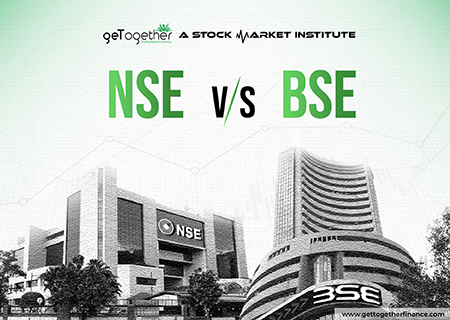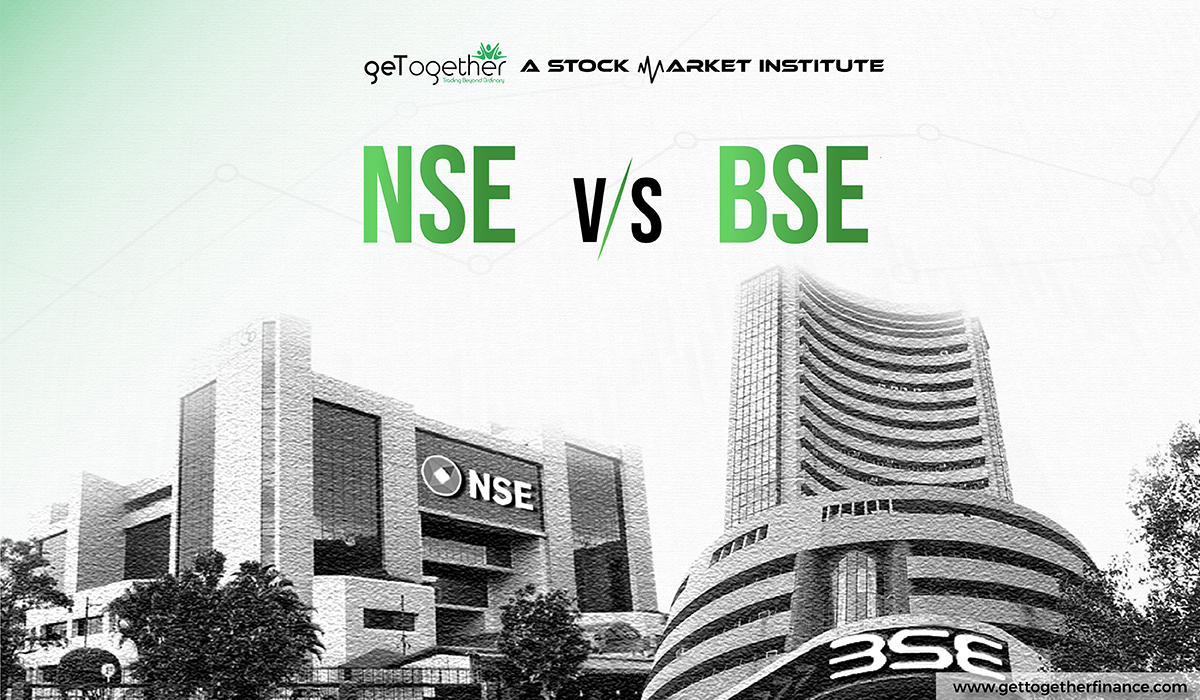NSE vs BSE


Table of Contents
ToggleOverview
Have you heard about Mumbai’s famous Dalal Street? The thing that made Dalal Street famous across the globe is Asia’s first stock exchange, the Bombay Stock Exchange. Stock exchanges are the place or platforms where all public companies are listed. There are two top stock exchanges in India, referred to as NSE vs BSE. People can invest or trade their money in the companies with the help of a stock exchange.
In all, stock exchanges are the mediator between companies and their shareholders. In India, there are two top stock exchanges; the Bombay Stock Exchange and National Stock Exchange. Though BSE was established far before the NSE, NSE is currently the biggest stock exchange in India, despite BSE being the oldest. Although, people are stuck in the thoughts of NSE vs BSE, at the current time, both are contributing equally to the economy of the country.
National Stock Exchange

National Stock Exchange (NSE) is also one of the leading stock exchanges of India, based in Mumbai. It was established in 1992 to make the equity market of India more transparent and reliable. NSE was the first stock exchange in India to offer paperless trading and investment facilities. This helped NSE in taking over the daily turnover of BSE in just 1 year of commencement.
The Indian government played a huge role in the establishment of the NSE, thus it is established under the ownership of various financial institutions such as finance companies and banks.
Currently, NSE is the world’s largest derivatives exchange with the highest number of contracts traded. Also, it is one of the largest stock exchanges in the world with a market capitalization of US$3.27 trillion.
On April 22, 1996, NSE introduced its flagship index, NIFTY50. It is composed of the top 50 trading companies in NSE. It has been helping people around the globe to track the performance of the Indian capital market. Currently, it has more than 1600 companies listed.
With great stakeholders and adequate government support, NSE has emerged as one of the most successful and reliable stock exchanges in India. In 2000, NSE commenced trading in derivatives with the launch of index futures. This led NSE to make a global mark with the help of its futures and options segment. This has given a lead to NSE in the NSE vs BSE war.
Bombay Stock Exchange

Bombay Stock Exchange is Asia’s first stock exchange, established in 1875 by Premchand Roychand. Currently, BSE is ranked as the top 10th stock exchange in the world, with more than 5000 listed companies. It started its operations on 9 July 1875, with the name “the native share and stock brokers and association”.
Bombay stock exchange is one of the most renowned stock exchanges in the world and it is currently valued at US$3.8 Trillion. Apart from numerous companies, BSE offers trading and investment opportunities in equity, debt, commodities, etc.
Like all other stock exchanges in the world, BSE ensured quick liquidity of funds for its investors and traders. With technological advancements, people can now buy or sell stocks with the help of online software from any corner of the world. This has become possible because of accurate information given by BSE along with swift and reliable services. Currently, it has more than 5000 companies listed.
BSE introduced its first equity index, SENSEX in 1886. This comprised the top 30 trading companies in the stock exchange from 10 different sectors. The aim of SENSEX was to help people understand the momentum of the market led by stocks.
Also Read: Role of SEBI
Which Stock Exchange is Better, NSE vs BSE?

National Stock Exchange and the Bombay Stock Exchange (NSE vs BSE), both are renowned and reliable stock exchanges in India. Though NSE is younger than BSE, it has an equal level of popularity and reliability. Currently, almost all the companies are listed on both stock exchanges. One of the major differences between both stock exchanges is that NSE promotes trading in equity, debts, and currency derivatives.
Whereas, BSE promotes trading and investment in debt instruments, currency, and mutual funds. Currently, BSE is trying to revive its derivative contract by introducing SENSEX and BANKEX’s F&O contracts. This gives us the conclusion that NSE vs BSE is not a big war, both have minimal differences. Both stock exchanges are equally safe to invest or trade.
Oldest Stock Market in India

Bombay Stock Exchange (BSE) is the oldest stock market in India which was established in 1875 by a cotton merchant Premchand Roychand. BSE is India’s first recognized stock exchange by the government under the Securities Contracts Regulation Act of 1957.
NSE and BSE: Similarities

National Stock Exchange (NSE) and Bombay Stock Exchange (BSE) are the stock exchanges in the Indian securities market that work quite similarly to maintain the exchange of securities and regulate the overall process.
Listing and Trading
NSE and BSE as a stock exchange allow companies to list their shares so that they can raise funds from the general public. Investors can trade listed shares on these platforms.
Regulatory Oversight
Securities and Exchange Board of India (SEBI) is the regulatory body which oversees the working of both BSE and NSE. SEBI ensures that the stock exchanges adhere to fair trading experience, protect investors, and maintain market integrity.
Financial Instruments
The stock exchange offers a wide range of financial instruments like equities, bonds, derivatives, exchange traded funds, and mutual funds. Number of financial instruments provides diverse investment strategies among several assets.
Electronic Trading
With the help of BSE and NSE, electronic trading is made i.e. there is no requirement of physical shares. BSE and NSE have adopted electronic trading systems for efficient and seamless trading experience.
Popularity
BSE and NSE are very popular in the Indian securities market and majority of investors look forwards for these markets only.
Trading Hours
BSE and NSE have similar trading hours i.e. from 9:15 a.m. to 3:30 p.m.
BSE vs NSE: Conclusion
Looking at the differences and similarities, we can consider that choosing a stock exchange must align with an investor’s goals, risk appetite and trading preferences. As an investor, you can get more opportunities in NSE because of the vast number of companies listed in it. However an investor’s choice depends on the companies listed on the stock exchange in spite of NSE or BSE.
FAQs
1. What is the difference between NSE and BSE, which one is better in NSE vs BSE?
NSE and BSE both are top stock exchanges in India. Though NSE is way younger than BSE, the credibility of both the stock exchanges is the same. NSE started electronic trading right from its commencement and thus has higher liquidity than the BSE. This means, it is not fair to conclude on NSE vs BSE on a singular factor, both are good in various factors.
2. Can I buy the stock on the NSE and sell it on the BSE?
After buying delivery of shares in your demat account from NSE, you can easily sell it on BSE.
3. In NSE vs BSE, which is better, SENSEX or NIFTY?
The benchmark indices of the BSE and NSE are the Sensex and Nifty, respectively. The Nifty, which consists of 50 stocks, is a broader index than the Sensex, which consists of the top 30 performing stocks. As a result, the Sensex is more specialized. As a result, when the market is up, the top companies do better, pushing the Sensex higher.
4. Why is NSE better than BSE in NSE vs BSE?
In NSE vs BSE, NSE has surpassed the market cap of BSE easily because of electrical trading. NSE introduced electronic trading since its commencement, this helped it in gaining popularity.
5. NSE vs BSE, where should I invest?
Both stock exchanges are equally safe and secure. You can invest in any of the stock exchanges, based on the listing of companies.
CATEGORIES



 Facebook
Facebook Instagram
Instagram Youtube
Youtube
